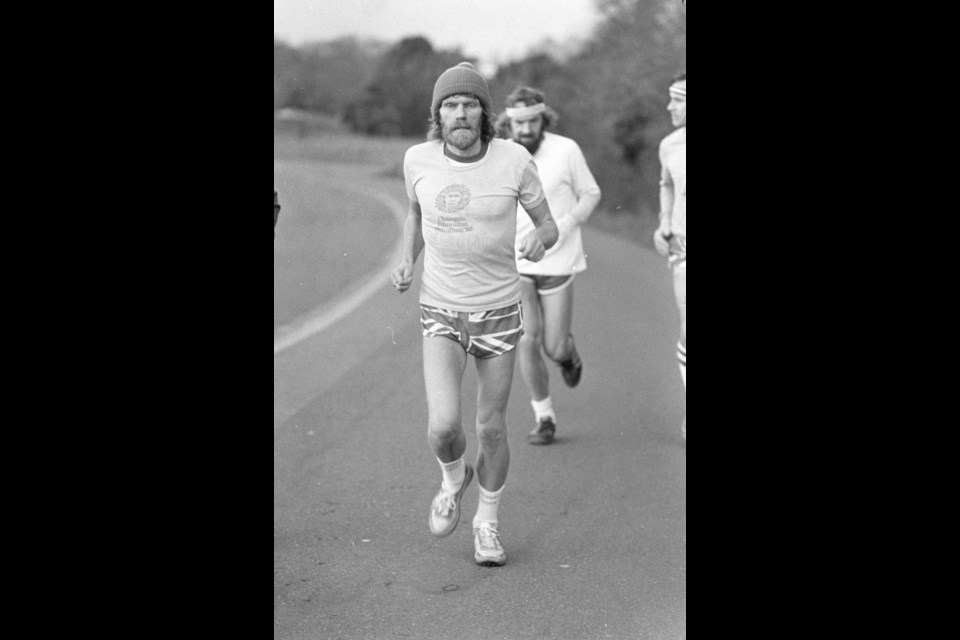Before extreme, endurance and ultra sports went mainstream, there was Al Howie.
The legendary ultra-marathoner died suddenly Tuesday in Duncan at the age of 70. The cause of death was not known, but Howie was described by his family as suffering from unstable diabetes and unwell for some time.
There are four people commemorated along Dallas Road for their physical feats. Howie is among them, along with runners Terry Fox and Steve Fonyo and strait swimmer Marilyn Bell.
The brass plaque honouring Howie is embedded into the Mile Zero sign beside the Fox statue and signifies Howie’s running of the Trans-Canada Highway in 1991 from Mile Zero in St. John’s, N.L., to Mile Zero in Victoria. It took him 72 days, 10 hours and 23 minutes to traverse the 7,295 kilometres. It was the equivalent of running almost 2 1/2 marathons each day.
He also set the world record for the longest continuous run — 580 kilometres around the Centennial Stadium track in 104 1/2 hours — to promote the 1994 Victoria Commonwealth Games.
Howie was born in Ayrshire, Scotland, and won more than 50 marathons, ultra-marathons and stage races during his career. He was inducted into the Greater Victoria Sports Hall of Fame with the Class of 2014.
He was simply relentless in pursuit of his running goals. Tree planting was a way to make ends meet while he chased his true passion.
“Al had a very unusual ability to focus totally on something that mattered to him,” said his wife, Claudia Cole.
“He had an astonishing ability to focus and to keep going. He was strictly interested in what he set out to accomplish.”
It might have been something he was born to do.
“After World War II in Scotland, the only vacations the family could afford were walking treks in the Highlands, and so his family was very much into physical activities,” Cole said.
“Al’s father [Arthur] and mother [Mary] were champions in boxing and swimming, respectively, so I definitely believe there was something genetic to it.”
Howie moved to Victoria in 1978.
Known as bit of an eccentric, as many ultra and extreme athletes are, Howie was as interesting a character off the road as on it.
“Al was unusual but nice,” Cole said.
“He loved animals and kids the best.” So much so he raised more than $750,000 through his running, mostly for children’s causes, including the 233-kilometre Run for Your Life treks from Victoria to Courtenay to help send children with diabetes to a summer camp. He also ran in fundraising support for the Times Colonist 1000 Fund and United Way.
But Howie’s running rarely paid off personally.
“Howie is one of the world’s best runners, but right now he can’t even get a shoe sponsor, let alone anyone to help with the bills,” Times Colonist reporter Jody Paterson wrote in a 1998 column.
Despite the poor economics of it, Howie was a running man and that’s what he did. He didn’t just run in marathons, he ran to marathons. He ran from Victoria to Prince George in 1979 to take part in that city’s annual marathon. After winning his age group in the 1980 Edmonton marathon, Howie ran back to Victoria to take part in the inaugural Royal Victoria Marathon 11 days later and placed 14th overall.
Often running while wearing his patented toque and Union Jack shorts, Howie was a six-time winner of the Canadian 24-Hour Running Championships. In 1989, Howie became the first person to complete the 1,300-Miler Race in New York state, which he did in 17 days and nine hours.
“It helped that Al had a runner’s body: He was all legs with not much weight,” Cole said.
And all heart.
Howie is survived by wife Claudia, her family, and his children Gabe and Dana.



